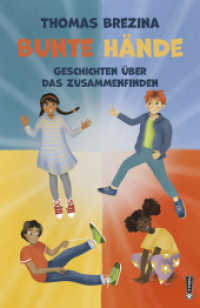- ホーム
- > 洋書
- > 英文書
- > Literary Criticism
Full Description
The Oxford Handbook of Dante contains forty-four specially written chapters that provide a thorough and creative reading of Dante's oeuvre. It gathers an intergenerational and international team of scholars encompassing diverse approaches from the fields of Anglo-American, Italian, and continental scholarship and spanning several disciplines: philology, material culture, history, religion, art history, visual studies, theory from the classical to the contemporary, queer, post- and de-colonial, and feminist studies. The volume combines a rigorous reassessment of Dante's formation, themes, and sources, with a theoretically up-to-date focus on textuality, thereby offering a new critical Dante. The volume is divided into seven sections: 'Texts and Textuality'; 'Dialogues'; 'Transforming Knowledge'; Space(s) and Places'; 'A Passionate Selfhood'; 'A Non-linear Dante'; and 'Nachleben'. It seeks to challenge the Commedia-centric approach (the conviction that notwithstanding its many contradictions, Dante's works move towards the great reservoir of poetry and ideas that is the Commedia), in order to bring to light a non-teleological way in which these works relate amongst themselves. Plurality and the openness of interpretation appear as Dante's very mark, coexisting with the attempt to create an all-encompassing mastership. The Handbook suggests what is exciting about Dante now and indicates where Dante scholarship is going, or can go, in a global context.
Contents
Manuele Gragnolati, Elena Lombardi, and Francesca Southerden: Introduction. Dante Unbound: A Vulnerable Life and the Openness of Interpretation
Part I: Texts and Textuality
1: Justin Steinberg: The author
2: Lina Bolzoni: Memory
3: Mary Carruthers: Reading
4: Martin Eisner: Materiality of the text and manuscript culture
5: Fabio Zinelli: The manuscript tradition, or on editing Dante
6: Luca Fiorentini: Commentary (both by Dante and on Dante)
7: Akash Kumar: Digital Dante
Part II: Dialogues
8: Zygmunt G. Baranski: The Classics
9: Antonio Montefusco: Roman de la Rose
10: William Burgwinkle: Troubadours
11: Roberto Rea: Early Italian lyric
12: Fabian Alfie: Comic culture
13: Gervase Rosser: Visual culture
Part III: Transforming Knowledge
14: Franziska Meier: Encyclopaedism
15: Natascia Tonelli: Medicine
16: Simon Gilson: Visual theory
17: Diego Quaglioni: The law
18: Tristan Kay: Politics
19: Pasquale Porro: Philosophy and theology
20: Alessandro Vettori: Religion
21: Elena Lombardi: Poetry
Part IV: Space(s) and places
22: Giuliano Milani: Florence and Rome
23: Elisa Brilli: Civitas/Community
24: Karla Mallette: The Mediterranean
25: Brenda Deen Schildgen: The East
26: Johannes Bartuschat: Exile
27: Theodore J. Cachey, Jr.: Travelling/wandering/mapping
28: Peter Hawkins: Dante's other worlds
Part V: A passionate selfhood
29: Manuele Gragnolati: Eschatological anthropology
30: Heather Webb: Language
31: Bernard McGinn: The mystical
32: Cary Howie: Bodies on fire
Part VI: A non-linear Dante
33: Nicolò Crisafi: The master narrative and its paradoxes
34: Jennifer Rushworth: Conversion, palinody, traces
35: Francesca Southerden: The lyric mode
36: Teodolinda Barolini: Errancy: A brief history of Dante's Ferm Voler
Part VII: Nachleben
37: Martin McLaughlin: Translations
38: Rossend Arqués Corominas: Dante and the performing arts
39: John David Rhodes: Dante on screen
40: Daniela Caselli: Modernist Dante
41: Lino Pertile: Dante and the Shoah
42: Jason Allen-Paisant: Dante in Caribbean poetics: Language, power, race
43: Gary Cestaro: Queering Dante
44: Marguerite Waller: A decolonial feminist Dante: Imperial historiography and gender






